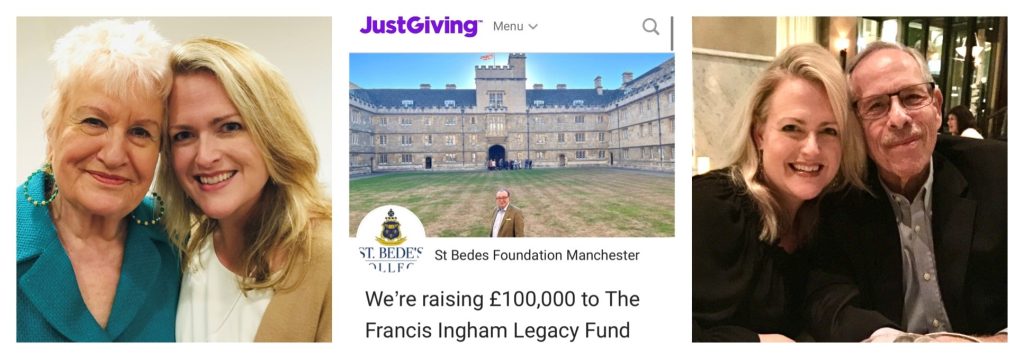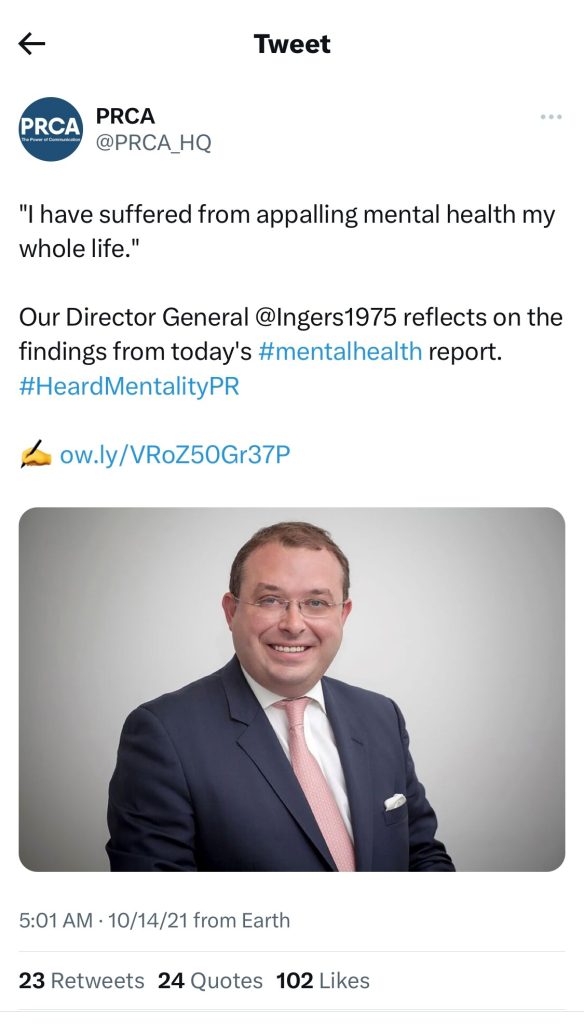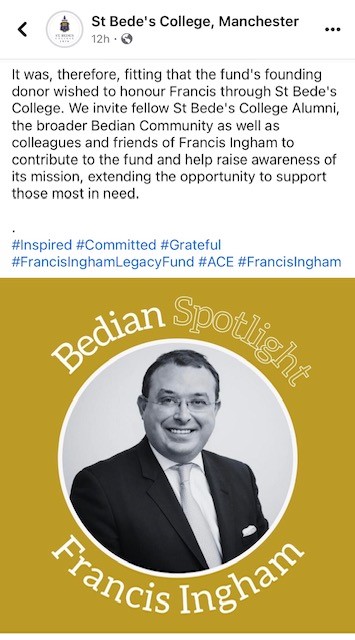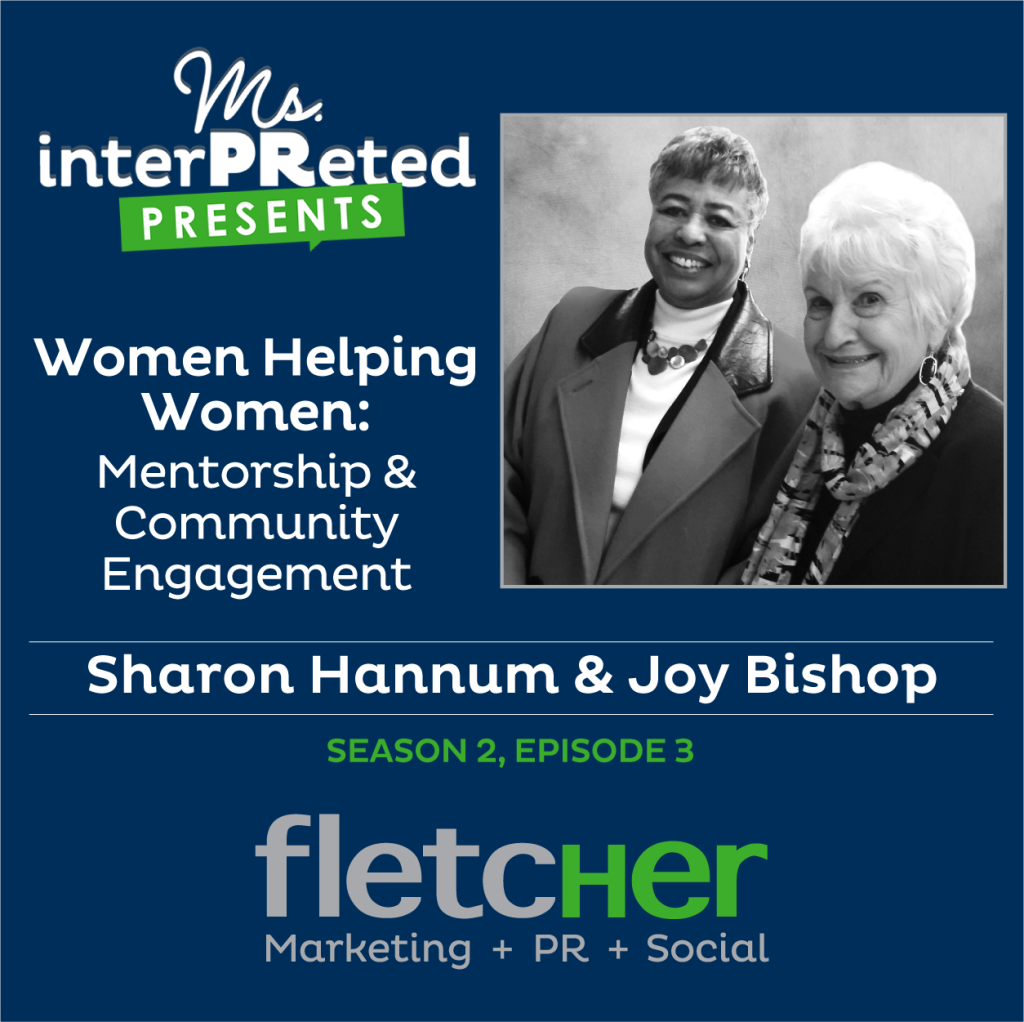Legacy in the Face of Loss: The Catharsis of Philanthropic Memorials
I wasn’t able to attend Joy’s funeral.
My friend and mentor, Joy Bishop – a beloved figure in my local community for her public service, leadership, and administrative trailblazing at the Pentagon for the U.S. Air Force – succumbed to a long illness on February 14, 2023… Valentine’s Day, of all days.
While poetic in a way, Joy’s passing that day launched a some 30-day litany of heartbreak for me, in losing several people important to my life, giving credence to the lore of bad things happening in threes.

Joy had been ill for quite some time, but her life had been a full and accomplished one… in many ways, the kind of life I someday would like to be able to look back on, after 80-some-odd trips around the sun.
I think Joy would have understood why I couldn’t be there… she always did, in matters where I fell short.
There were numerous times in prior years when she would invite me over to her impeccably decorated home — straight out of a “Southern Living” shoot — for lunch. A Texas rose, she made everything herself… with a specialty of a mixed green salad with grilled chicken and some sweet tea on the side – a very “southern ladies who lunch” kind of affair.
One time, on a particularly over-scheduled and vexing day, I utterly spaced-out that I was supposed to darken her door at high-noon for a lunch visit… meaning, I completely no-showed. Hours later, upon realizing my infraction in horror, I called her to apologize profusely. She graciously and forgivingly laughed it off, as we rescheduled for a different date.
But that’s how Joy was. She was a gal’s gal.
When I stood up publicly against a local hospital CEO who was engaged not only in bullying females but also violating governance bylaws amid serious audit questions, Joy had my back. She sent messages to me of support and solidarity, telling me in no uncertain terms, “I love you, and I’m proud of you.”
Her intentionality in connecting with me and building personal fellowship (as she did with so many others in our community) meant a great deal to me.
It felt like a fitting tribute when our town named a pedestrian bridge connecting downtown to our local library, in Joy’s memory. As Joy led the fundraising for the library’s original construction in the 1990s, this community’s commemorative gesture was also symbolic. Joy knew how to build bridges and to maintain them, in good times and bad. I’ve always tried to remind myself that I can never stop learning anew from Joy’s life examples.
The loss of Joy Bishop occurred the very day after I arrived frantically in the U.K., in nothing short of a different life-or-death emergency.
My memories here merit a bit more detailed treatment, so please pardon the open-air therapy session.
PR industry icon Francis Ingham had attempted multiple times from autumn 2022 to early February 2023 to get help with an alcohol problem. Only it wasn’t just an alcohol problem.
As I learned over the last 18 months of his life, his chronic alcohol use was merely a symptom itself of a deep-seated personal brokenness from events in his 47 years – some of them unspeakable from his distant past; others having recently threatened his livelihood – that overwhelmed his fight / flight / freeze reflexes.
Of those three options, “Fight!” was always Francis’ factory-default setting, as it was the only method by which he survived his earliest years.
Sadly, the numbing effects of alcohol had become a standard-issue component of his lifelong, overly worn battle armor. Ultimately, it fueled the chemical toxicity that took his life, but not without his putting up the final fight of his life, to which I (and several others who cared about him deeply) sat — tragically, front-row-center.
Truth be known, his stage of liver failure technically had already entered a terminal phase by year-end 2021, as I only later learned from physicians after he was admitted to hospital on 13 February 2023.
Interestingly, it was in autumn 2021 that Francis tried to alert the industry he served and loved, that he was struggling. He issued a very personal, yet very public statement, to that effect.
It was a risky statement, too, in terms of letting his guard down enough to reveal to everyone (including his numerous on-the-record and off-the-record detractors) a true weak spot in his battle armor.
While purposely revealing such an intimate vulnerability conflicted entirely with his “Fight!” nature (and, as he well knew, notably committed that fatal violation of battlefield basics of not gifting to your enemy a stash of live ammunition) — he did it anyway. And it he did it for the express purpose of wanting to help other people who struggled as he did, post-pandemic:

Shortly after he made this statement concerning his mental health in autumn 2021, we had a conversation where I myself came to learn that Francis had a significant alcohol problem. What I did not know, however, was that he was already in liver failure due to many years of this problem. I also had no idea the already-terminal scale of it. He never communicated to me that he was dying of liver failure (I’m unsure whether even he knew it either, prior to his hospitalization in February 2023).
While he did relay to me and to many others that he was grappling with some form of serious illness — occasionally mentioning off-handedly what sounded like very concerning symptoms — there was enough vagueness to his references about it, that I never knew quite what to make of it.
If only he had known clearly about his own terminal condition and — this is a big “and” — also had been realistic enough with himself, and felt supported enough, to seek formal treatment that year, in 2021, instead of time essentially running out, he may have had enough months on his side to emerge as a viable candidate for a liver transplant in 2022.
UK health authorities require at least six full months of strict alcohol abstention before one can qualify for liver-transplant consideration. With such a transplant, Francis might even be alive and functioning well today.
But it was not to be.
Making a public statement about his mental health that ultimately was lauded by his colleagues as courageous advocacy was one thing. But the occupational risks posed by his entering what would have been mandated as a multi-month in-patient treatment program — requiring relinquishment of his laptop and phone and any ability to continue doing his job — was quite another.
That lost opportunity of timing stands as only one of numerous gut-wrenching could-have’s and what-if’s that I and others close to him have confronted, ever since he died. These unrealized, forever-lost possibilities ricochet and echo in our heads, on a continuous, haunting auto-replay loop. Speaking for myself, the emotional pain of these mental retrospectives felt, at times, debilitating this past year.
Late in 2022, Francis’ situational factors had changed, and seek help, he did. “Seeking,” however, was not the same as “receiving,” as I was to learn first-hand… in yet another lost opportunity.
In defense of Francis’ valid attempts (plural) to access alcohol treatment throughout the last five months of his life prior to his hospitalization, there is, of course, this aspect of what’s systemically broken: the U.K.’s complex, maze-like institutional-health gauntlet demanded of any Brit who requires in-patient treatment for alcohol addiction (I’ve heard that the system in the U.S., where I live, may not be much better).
This red-tape-riddled labyrinth (my opinion) proved untenable for a man who felt extremely conflicted about even seeking this kind of assistance, due to a range of highly public, complex factors going on in his life at the time… not the least of which were his concerns about being penalized by certain third parties for even needing that level of help in the first place. He’d already handed over live ammunition, so to speak, in 2021; he couldn’t see the logic of doing it again while under duress.
When I showed up at his doorstep and immediately called paramedics on 13 February 2023 to get him transported to hospital, I reasoned – in my own naiveté of how liver failure and jaundice work – that his hospital stay would only span several days, or maybe even a week. I packed my bag and booked my hotel, accordingly.
I anticipated that over this relatively short duration, a well-managed I.V. drip could clear up his excessive jaundice, so that he could proceed immediately to a specialized treatment center to begin a process of definitive change toward better health. In fact, it was my plan to drive him myself following his hospital stay directly to a treatment center that he had earlier attempted and that had his case on file. Such a direct transport would circumvent his somehow declaring himself “cured” in hospital and finagling a car service to deliver him straight home instead, only for him to fall into the very same stress-induced patterns of now-deadly self-medication.
But once Francis was in that hospital in mid-February, his attending physicians refused to let him leave. And their diagnostics proved they were correct not to do so.
“If you leave here, you will die,” they told him by Day Four at his hospital bed, point-blank, confirming my worst fears. Not to place too fine a point on his dire situation, they also stated firmly as a result of his rather stubborn verbal insinuations that he might simply call a car to come pick him up: “If you even attempt to leave this ward, we’re calling security.”
Forget “fight” or “flight.” For perhaps the first time in his adult life, Francis Ingham was being commanded to “freeze,” and he had no choice but to do so, under medical orders.
His health appeared on a few occasions while in hospital to rally, albeit slightly, in modest episodes over the weeks I was there, which served to fuel glimmers of false hope for a potential recovery. Ultimately, though, the bodily damage proved too far-gone.
By the end of February 2023, his systems were clearly shutting down, one by one, with one shut-down spawning the next, in a slow-motion yet unstoppable, domino-like chain reaction. Medications to mitigate one shut-down only unintentionally exacerbated the onset of a new one. For his medical team, it was like that metaphor of the acrobatics required to keep a dozen plates spinning gyroscopically atop poles at one time, yet, one by one, the plates each started wobbling and crashing to the floor, as an inevitable end drew near.
Francis’ journey is a larger story for another day — and yes, there is far more to this story — inasmuch as sharing it might offer the potential to scare some people straight, who otherwise deceive themselves into presuming they can kick the can of self-care down the road and somehow never wake up one day to their body declaring a harsh and unapologetic mutiny against them, as in:
“I’m done here. Goodbye.”
To that effect, Francis Ingham wasn’t keen to leave this world or the people in it, most especially, his children. He didn’t want to exit, stage right. But liver failure doesn’t care about a liver owner’s opinions of such matters. Neither your brain nor your heart get a vote, when the rest of your body’s endurance has already voted physiologically with its feet.
There’s so much more to Francis’ own story than how his life ended, including the scale of triumphs he achieved, in the face of massive odds against him… and there were many.
It’s good to see that — finally — some aspects of his rightful legacy are coming to the fore, thanks to two charitable funds by two separate entities launched last week, in Francis’ name:
- St. Bede’s College-Manchester Francis Ingham Legacy Fund – to help underprivileged children to access counseling services for Adverse Childhood Experiences (ACEs)

- PRCA’s Professional Development Francis Ingham Fund – to benefit the Taylor Bennett Foundation
For those who cared for Francis and who might find personal healing by an act of giving for others’ benefit, I encourage personal participation in either of these charitable opportunities, or both.
And then there were three:
Dave died three days after Francis – one year ago today, at this writing (March 19). The news only arrived to me days after his passing, and it came as a shock to my system, already overwhelmed with grief.
David M. Bicofsky graciously gave of his time, expertise, and counsel to me as a professional mentor and dear, personal friend, for 30 years. I first met him in spring 1993, at a PRSSA National Committee meeting in Chicago, while I was a student leader and he, the national PRSA / PRSSA board liaison.

Anyone who knows me well in professional circles this past decade knows my struggles with PRSA… now going on around eight years.
As an APR Fellow in PRSA and a past president of PRSA’s New York Chapter, Dave’s loyalty to PRSA had once been quite deep. In fact, it was largely his own example of loyalty to the highest standards of PR practice that taught me to be loyal in the same ways. Dave was the one who escorted me during my own PRSA College of Fellows induction, in 2017.
But Dave’s particular loyalty to PRSA ended when Dave saw, in episode after episode, PRSA’s horrendous treatment of valid concerns, as well as their denigration of me personally, á la “shoot the messenger.” A former journalist, Dave’s greater loyalty was always in service to the truth. As such, he dropped his PRSA membership in Year 49 of his affiliation with the association.
I’m sure his act of walking away from PRSA was painful, or at least unpleasant, for him, given all he had invested in it over decades. I certainly didn’t ask him to do it, but he made sure I knew that he did it of his own accord. In so doing, he demonstrated what loyalty to the truth really is. And he certainly was loyal to me and the faith I placed in him. Loyalty sometimes means making sacrifices and wading into very uncomfortable waters.
It’s because of my own loyalty toward Dave’s support of public relations education and students that I’ve tried to pay those feelings forward, by underwriting student access and participation to a variety of professional development opportunities, as well as toward industry research that matters… and that I know would have mattered to Dave.
I had an opportunity to support such an event recently in Belgrade, at the 21st Annual PRO PR Conference. Thank you, Dave, for the inspiration.
It’s March 19 today … the first day of Spring 2024.
All the renewal-of-life imagery and spiritual connections of the season mean even more to me this year. Getting the past 12-18 months behind me has been beyond challenging. In a few weeks, however, Easter happens to fall on my birthday. I couldn’t be more grateful for that fortunate timing.
Reflecting on how the passing of these dear souls registered in my own life is – for me – all part of a healing process, but one that I rather doubt will ever feel complete.
Nonetheless, it does bring solace that we have so many ways availed to us to give, in memory of those we’ve lost.
Philanthropy in memory of loved ones offers a certain catharsis from pent-up emotion, be it sadness, isolation, regret, confusion, anger, or even rage. They’re all valid emotions, but managing them in positive ways is essential for one’s own wellbeing.
We are placed here in this world to live… and to live not just for ourselves but also in service to others, including others’ legacies of kindness, hope, and a better way forward, when they can no longer live for those purposes themselves.
I truly appreciate all who help support charitable efforts and make them possible.


